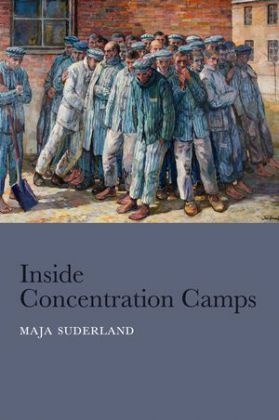Ulteriori informazioni
Informationen zum Autor Maja Suderland teaches sociology at the Darmstadt University of Applied Sciences. Klappentext Terror was central to the Nazi regime, and the Nazi concentration camps were places of horror where prisoners were dehumanized and robbed of their dignity and where millions were murdered. How did prisoners cope with the brutal and degrading conditions of life within the camps?In this highly original book Maja Suderland takes the reader inside the concentration camps and examines the everyday social life of prisoners - their daily activities and routines, the social relationships and networks they created and the strategies they developed to cope with the harsh conditions and the brutality of the guards. Without overlooking the violence of the camps, the contradictions of camp life or the elusive complexity of the multicultural prisoner society, Suderland explores the hidden social practices that enabled prisoners to preserve their human dignity and create a sense of individuality and community despite the appalling circumstances.This remarkable account of social life in extreme conditions will be of great interest to students and scholars in history, sociology and the social sciences generally, as well as to a wider readership interested in the Holocaust and the concentration camps. Zusammenfassung Terror was central to the Nazi regime, and the Nazi concentration camps were places of horror where prisoners were dehumanized and robbed of their dignity and where millions were murdered. How did prisoners cope with the brutal and degrading conditions of life within the camps?In this highly original book Maja Suderland takes the reader inside the concentration camps and examines the everyday social life of prisoners - their daily activities and routines, the social relationships and networks they created and the strategies they developed to cope with the harsh conditions and the brutality of the guards. Without overlooking the violence of the camps, the contradictions of camp life or the elusive complexity of the multicultural prisoner society, Suderland explores the hidden social practices that enabled prisoners to preserve their human dignity and create a sense of individuality and community despite the appalling circumstances.This remarkable account of social life in extreme conditions will be of great interest to students and scholars in history, sociology and the social sciences generally, as well as to a wider readership interested in the Holocaust and the concentration camps. Inhaltsverzeichnis Foreword by Beate Krais Preface Translator's note A. Introduction 1. Topic and research question 2. The 'Third Reich' and the Nazi concentration camps 2.1. The establishment of the Nazi concentration camps: Historical, social and legal background 2.2. Germany and its forcible detention camps 2.3. The organizational structure of the concentration camps 2.4. The concentration camp SS and guards 2.5. Summary: A complex interrelationship B. Sociological avenues of inquiry 3. Introductory comments on the disciplinary context and methods 3.1. Empirical material and methodological approach 3.2. The impossibility of representing reality and the special characteristics of Holocaust literature 3.3. The relationship between historical scholarship and sociology 4. Sociological orientations 4.1. Preliminary remarks: The sociology of Pierre Bourdieu and the use of other central theoretical ideas 4.2. The 'basic concepts' of society 4.2.1 Individuals and society: Views of a complex relationship 4.2.2 Classes and ways of life: Social differentiation 4.2.3 Gender: Physical characteristics and their symbolic significance for social differentiation 4.2.4 'Ethnic group' and caste: The belief in genetic kinship and the notion of social i...

